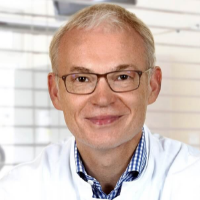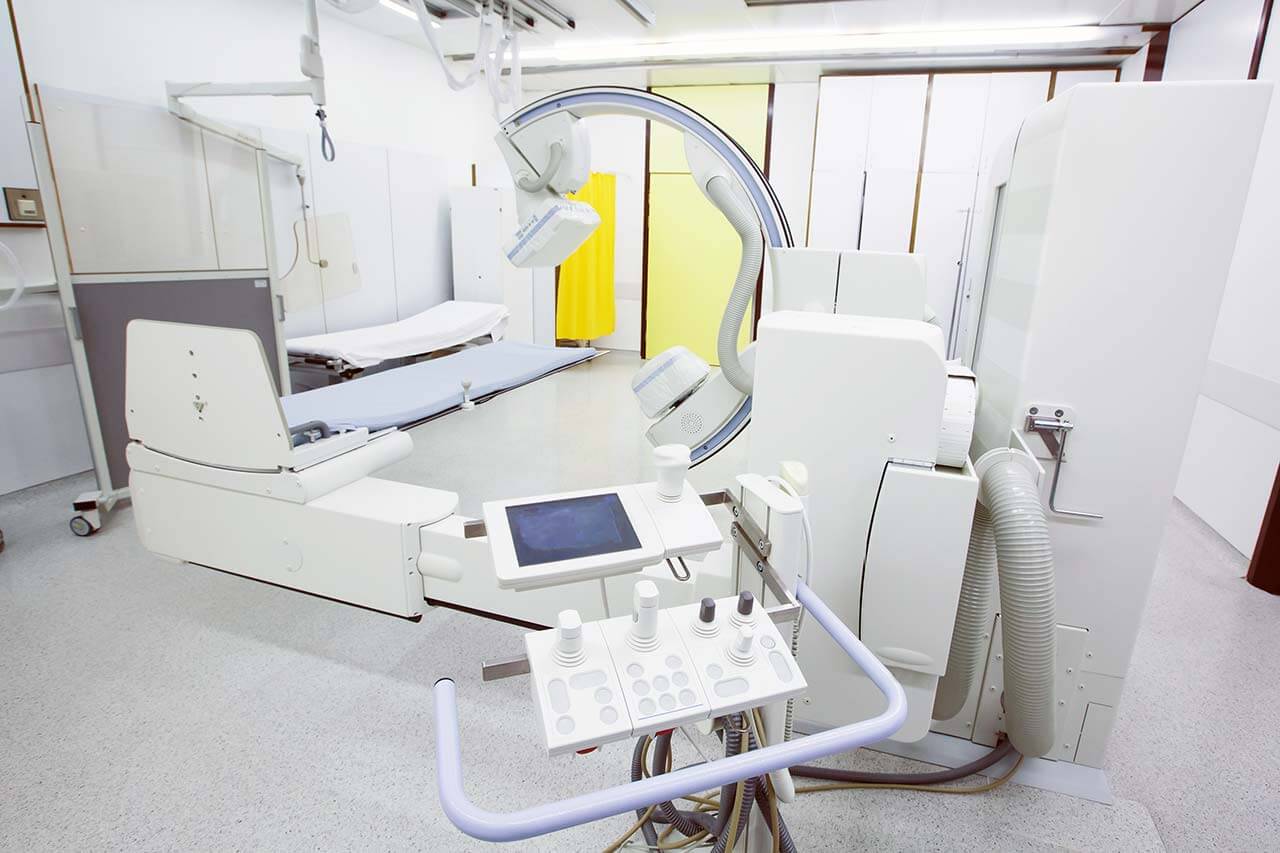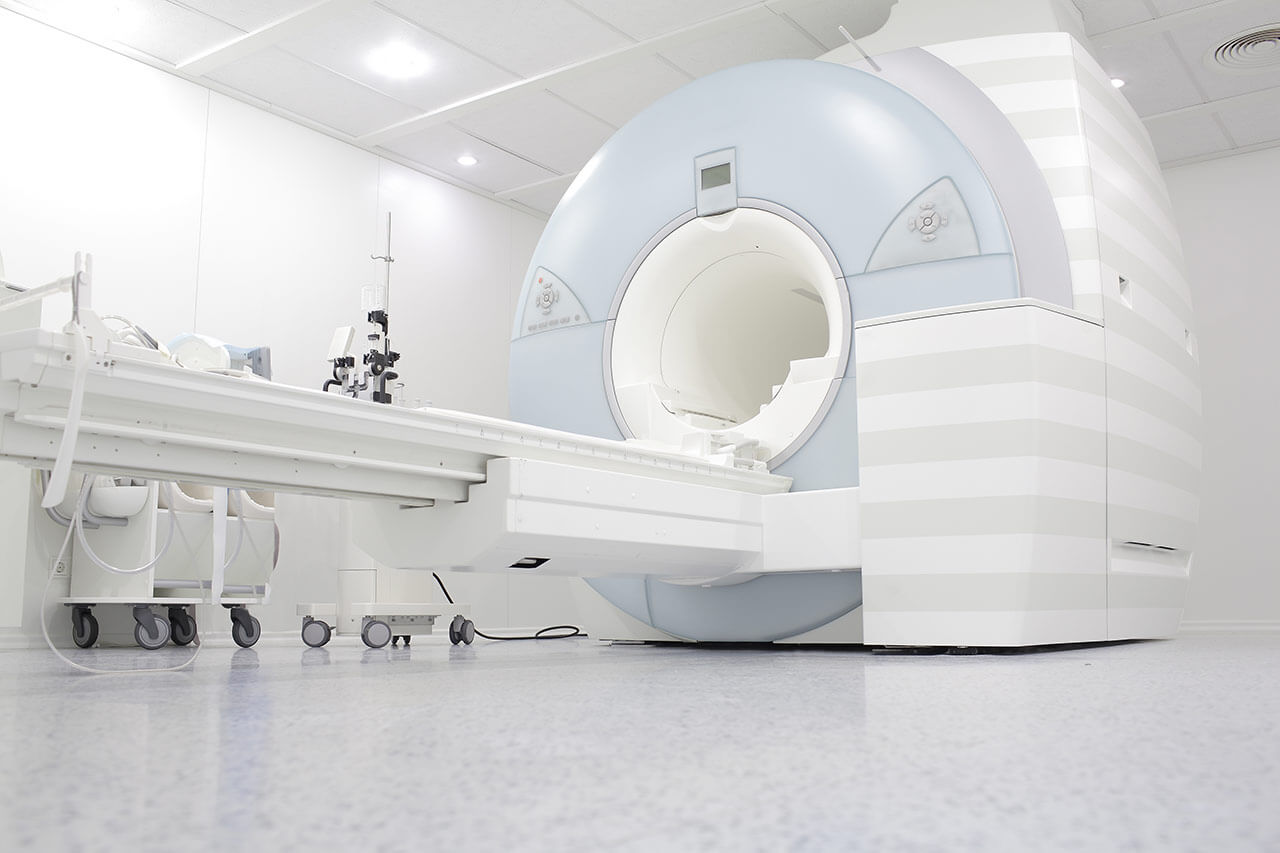
The program includes:
- Initial presentation in the clinic
- clinical history taking
- review of medical records
- physical examination
- laboratory tests:
- complete blood count
- general urine analysis
- biochemical analysis of blood
- inflammation markers (CRP, ESR)
- blood coagulation analysis (aPTT, PT, INR)
- hormone test (estradiol, progesterone, prolactin, DHEA-s, FSH, LH)
- gynecological examination.
- ultrasound examination: pelvis, abdomen, thyroid gland, breasts
- nursing services
- consultation of related specialists
- treatment by chief physician and all leading experts
- explanation of individual treatment plan
Required documents
- Medical records
Service
You may also book:
 BookingHealth Price from:
BookingHealth Price from:
About the department
The Department of Pediatric Nephrology, Hepatology, Gastroenterology, Neurology and Endocrinology at the Hannover Medical School offers the full range of services in these medical fields. The department specializes in the diagnostics and treatment of kidney, endocrine, gastrointestinal and liver diseases, as well as in the treatment of metabolic disorders and neurological diseases in children and adolescents. Of particular interest to the specialists are interdisciplinary treatment and diagnostics of complex diseases, kidney and liver transplant. The department is also part of the Center for Rare Diseases. The medical facility has 30 beds. The department's competent doctors annually admit more than 1,600 young inpatients, while about 10,000 children receive outpatient medical care. In addition, the department annually performs about 20 kidney and 30 liver transplants in collaboration with pediatric surgeons. The team of the department's doctors consists of 15 highly specialized physicians who deal with the treatment of a particular group of diseases. The department is headed by Prof. Dr. med. Dieter Haffner.
An important place in the department's clinical practice is given to the detection and treatment of kidney diseases, arterial hypertension and urinary tract pathologies in children of all age groups. Pediatric nephrologists have rich experience in the treatment of chronic kidney failure. The treatment involves the use of dialysis (renal replacement therapy), as well as diet therapy. The competence of doctors also includes care for children after kidney transplantation and for those children who are going to have such an operation soon.
The department often admits children with diseases of endocrine glands and hormonal disorders. The key attention is paid to the treatment of diseases of the thyroid gland, parathyroid glands, pituitary gland and adrenal glands, as well as to the treatment of growth and puberty impairments. To correct the work of endocrine glands, doctors most often use an individually selected drug therapy regimen.
In the field of pediatric gastroenterology and hepatology, the department's specialists provide the effective treatment of gastrointestinal and liver diseases. Children and adolescents are most often admitted with stomach, bowel, pancreatic and liver diseases. In addition, the specialists of this medical sphere take care of the preparation of small patients for liver transplant surgery and provide follow-up care for the child to prevent transplant rejection. It is worth noting that the department has the status of one of the leading pediatric centers of this kind in the European medical arena. To diagnose digestive and liver diseases, both laboratory and instrumental, as well as endoscopic procedures are used. In most cases, the first-line treatment is drug therapy, but pediatric gastroenterologists can also resort to therapeutic endoscopic interventions (for example, polyp removal, stenosis elimination, gastrointestinal bleeding treatment) in complex cases.
The department's therapeutic offer includes the treatment of diseases of the nervous system and metabolic disorders (protein metabolism disorders, carbohydrate and lipid metabolism disorders) in children. The medical team has long experience in the treatment of congenital malformations of the central and peripheral nervous system, genetic neurological disorders, epilepsy, inflammatory diseases of the nervous system, paralysis, neuromuscular diseases, chronic headaches. The specialists of the medical facility use drug therapy for the treatment of most of the above pathologies. A particular complex of drugs is prescribed individually, based on the child's diagnostic results.
The department's range of medical services includes:
- Pediatric nephrology
- Diagnostics and treatment of acute and chronic kidney diseases
- Examination and treatment of children and adolescents with urinary tract malformations or kidney malformations (in cooperation with the Department of Pediatric Surgery)
- Examination and treatment of children and adolescents with excretion of blood or protein in the urine
- Diagnostics and treatment of water-electrolyte imbalance
- Diagnostics and treatment of kidney calcification and kidney stones
- Outpatient infusion therapy for kidney diseases and after kidney transplantation
- Diagnostics and drug therapy of high blood pressure (hypertension) in children with kidney diseases
- Prevention of complications in chronic kidney diseases, including growth hormone therapy
- Outpatient care of young patients before dialysis
- Preparation and administration of dialysis, with a particular focus on home dialysis in the form of ambulatory peritoneal dialysis or home hemodialysis
- Preparation for kidney transplantation and monitoring after surgery
- Kidney transplantation (in collaboration with pediatric surgeons)
- Pediatric endocrinology
- Diagnostics and treatment of thyroid, parathyroid, pituitary and adrenal diseases
- Diagnostics and treatment of puberty disorders
- Diagnostics and treatment of growth disorders (especially after organ transplantation and appropriate drug therapy, in chronic diseases)
- Diagnostics and treatment of endocrine disorders after kidney, liver, heart and lung, bone marrow transplantation
- Interdisciplinary treatment of severe clinical cases
- Pediatric gastroenterology and hepatology
- Diagnostics and treatment of stomach, bowel, pancreatic and liver diseases
- Caring for young patients before and after liver transplant
- Liver transplantation and combined liver/kidney/lung /pancreas transplantation
- Gastroscopy, duodenoscopy and colonoscopy
- Liver biopsy and percutaneous endoscopic gastrostomy
- Metabolic disorders in children
- Diagnostics and treatment of all congenital metabolic diseases (protein, carbohydrate, lipid metabolism disorders)
- Treatment of metabolic disorders with diets (for example, low-protein, low-fat, carbohydrate-rich diet)
- Drug therapy
- Substrate reduction therapy
- Diagnostics and treatment of all congenital metabolic diseases (protein, carbohydrate, lipid metabolism disorders)
- Pediatric neurology
- Diagnostics and treatment of epilepsy
- Diagnostics and treatment of neuromuscular diseases
- Diagnostics and treatment of infantile cerebral palsy
- Diagnostics and treatment of motor disorders in children (for example, ataxia, dystonia, chorea)
- Diagnostics and treatment of acute and chronic inflammatory nervous system diseases (for example, meningitis, encephalitis, optic neuritis, Guillain-Barre syndrome, etc.)
- Diagnostics and treatment of congenital malformations of the nervous system in children (for example, spina bifida, hydrocephalus)
- Diagnostics and treatment of headaches in children
- Other diagnostic and therapeutic services
Curriculum vitae
After studying medicine at the Ruprecht Karl University of Heidelberg for 2 years, Dr. Haffner was a Scholar of the German Research Foundation in the Research Group "Experimental Studies of Kidney and Circulation" at the Ruprecht Karl University of Heidelberg. This contributed to the formation of the foundations of his research activities in the field of growth disorders and bone metabolism in children with chronic kidney disease. He received education in the field of pediatric and adolescent medicine, pediatric nephrology and neonatology in Heidelberg and London. In 2000, Prof. Haffner defended his doctoral thesis at the Ruprecht Karl University of Heidelberg. The subject was "Pathophysiology, kinetics of elimination and long-term effects of growth hormone in children with kidney hypoplasia''. Since 2000, he has been Senior Physician in the Department of Pediatrics (main focus – nephrology) at the Charite University Hospital Berlin. In 2005, he became the Head of the Department of Pediatric and Adolescent Medicine at the University Hospital Rostock. Since 2006, Prof. Haffner has been the Head of the Department of Pediatric Nephrology, Hepatology, Gastroenterology, Neurology and Endocrinology, as well as the Head of the KfH Center of Pediatric Nephrology at the Hannover Medical School. In addition to his clinical, research and teaching duties, he is also a Representative of the Center for Congenital Kidney Diseases, a Board Member of the Center for Research and Treatment in Transplantation (IB-Tx) at the Hannover Medical School and the Head of the Working Groups "Chronic kidney disease – mineral and bone metabolism disorders" (CKDS-MBD), the European Society for Pediatric Nephrology and Lupus Nephritis and the German Society of Pediatric Nephrology. He is a Co-Editor of "Children's Nephrology" and a Board Member of the European Society of Pediatric Nephrology, as well as a Member of the International Pediatric Nephrology Association. The main scientific interest of Dieter Haffner is the study of the pathophysiological foundations and the further development of treatment methods for acute and chronic kidney diseases, especially in terms of their influence on growth, bone metabolism and the state of the cardiovascular system. His purpose is to optimize the treatment of children with kidney diseases through the introduction of the results of fundamental clinical research into practice.
Research Interests
- Pathophysiology and treatment (dialysis/transplantation) of chronic kidney failure in children:
- Renal osteodystrophy
- Disorders of bone longitudinal growth and state of the epiphyseal cartilage
- Uremic vasculopathy/cardiomyopathy (endothelial dysfunction and ectopic calcification)
- Autosomal recessive kidney scleropolyakistosis
- Cell proliferation and apoptosis
- Inhibition of mTOR in an animal model (treatment with Rapamune)
- X-chromosomal dominant hypophosphatemic rickets
- Growth disorder (anthropometry/pathophysiological tests)
- rhGH and cinacalcet therapy
- Treatment of systemic lupus erythematosus
Memberships in Professional Societies
- German Society of Pediatrics and Adolescent Medicine.
- Working Group on Pediatric Nephrology.
- Working Group on Pediatric Endocrinology.
- European Dialysis and Transplant Association.
- European Society for Paediatric Nephrology.
- International Pediatric Nephrology Association.
Awards, Prizes and Honors
- 1993 Else Kröner Fresenius Prize of the Working Group on Pediatric Nephrology for the Best Poster Presentation at the 23rd Meeting of the Working Group on Pediatric Nephrology, Hamburg. Subject "Secondary hyperparathyroidism caused by treatment with a growth hormone in patients with hypophosphatemic rickets resistant to vitamin D".
- 1994 Award in Honor of the Memory of Jürgen Bierich of the Working Group on Pediatric Endocrinology. Subject: "Clearance of a recombinant hormone of human growth in healthy volunteers and patients with chronic kidney failure".
- 1994 Prize for the Best Summary of the 31st Congress of the European Renal Association, the European Dialysis and Transplant Association in Vienna. Subject: "Growth hormone therapy of young children with chronic kidney failure: 5-year experience".
- 1998 Poster Award of the Faculty of Medicine of the Ruprecht Karl University of Heidelberg as part of the Research Funding Program. Subject: "The combined influence of the parathyroid hormone and glucocorticoids on the proliferation of chondrocytes of the epiphyseal plate of growth."
Photo of the doctor: (c) Medizinische Hochschule Hannover (MHH)
About hospital
The Hannover Medical School has the status of a leading German medical facility. The advanced medical technologies, highly qualified specialists, as well as productive research activities form a solid basis for top-class medical service of the world standard. The hospital is proud of its outstanding achievements in the treatment of cancer, diseases of the lung, heart, kidney, liver and metabolic disorders, as well as surgical diseases.
The medical facility diagnoses and treats more than 63,000 inpatients and about 470,000 outpatients annally. These indicators are growing steadily, which indicates the reputability and prestige of the hospital in the European medical arena.
For decades, the hospital has been a pioneer in transplantation medicine and is one of the leading centers of this specialization in the world. It performs about 400 transplantations of solid organs annually. Also, the hospital has performed over 130 bone marrow transplantations. In addition, the hospital ranks among the world leaders in cochlear implantation for the treatment of hearing loss.
Much attention is paid to interdisciplinary cooperation. Since 2016, the hospital has the largest certified Cancer Center in the Federal State of Lower Saxony, which provides comprehensive, multidisciplinary medical care in accordance with the standardized protocols of cancer societies.
The specialists of the hospital offer patients not only modern treatment of the highest quality, but also attentive care, sympathetic attitude to the patient's problems and understanding of his individual needs. Thus, the patient can be sure that his health is in the safe hands of highly qualified doctors.
Photo: (c) depositphotos
Accommodation in hospital
Patients rooms
The patients of the Hannover Medical School live in comfortable and cozy rooms. Each patent room has an ensuite bathroom with shower and toilet. A standard patient room includes an automatically adjustable bed with an orthopedic mattress, a bedside table, a wardrobe, a TV and a telephone. You can use TV, telephone and Internet using a special chip card, which can be purchased at self-service terminals or ordered at the service counter. The hospital allows the patients to use mobile phones, with the exception of intensive care units, some departments and diagnostic rooms.
If desired, the patient can stay in an enhanced-comfort room. Such rooms are distinguished by a more sophisticated design, and are additionally equipped with upholstered furniture, a safe for storing valuables and a mini fridge.
Meals and Menus
The patient and the accompanying person are offered delicious and balanced three meals a day. Breakfast and dinner are served buffet style and lunch can be chosen from three set menus. All dishes are prepared by professional chefs using the freshest ingredients available in the region.
If you are on a specific diet for some reason, you will be offered an individual menu. Please inform the medical staff about your dietary preferences prior to the treatment.
Further details
Standard rooms include:
Religion
There is a chapel on the territory of the hospital, where Christian and Catholic services are regularly held. The hospital provides a prayer room for followers of Islam, which is open for visits 24 hours a day.
Religious services can also be provided upon request.
Accompanying person
During an inpatient program, an accompanying person can stay with you in the patient room or in a hotel of your choice.
Hotel
During an outpatient program, you can stay in a hotel of your choice. The managers will help you choose the most suitable options.




